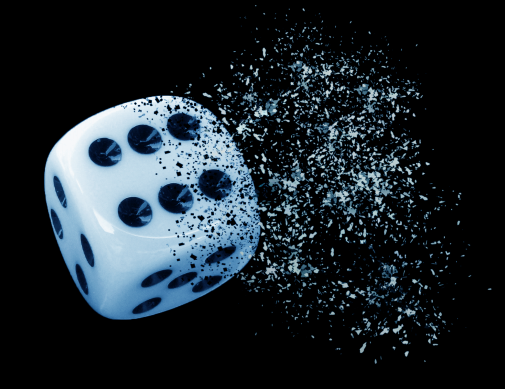A roll of the dice
Examining the impact luck plays on games

November 21, 2018
Watching as the die spirals through the air, the player holds his breath, crosses his fingers, hoping for the number that will win the game. It lands and bounces, once, twice, three times. He releases his breath and uncrosses his fingers, still waiting, hoping, when finally daring to take a peek for that lucky outcome.
However, as much as it may be hoped for at times, according to math teacher Martin Jennings, luck does not actually mathematically exist in games of chance, from rolling a die to playing cards. Instead, he says, the results are based on the probability of winning and balancing the payoff with the probability.
“It’s called weighted probability, so you consider the size of the pot with your chance of winning and go from there,” Jennings said. “Statistics is simply looking at the past and what’s already happened. And that may be trying to project what the future holds based on what the past. So luck? No, not really part of the mix.”
Junior Brandon Guo, who sometimes bets with his friends on various topics, from certain academic results to card games to the results of sports games, agrees on the lack of impact luck has on determining outcomes.
“I think a lot of people think that betting is a lot of luck-based, like, for example, if I lose this one game, I should win the next game or something,” Guo said. “And this kind of attitude is pretty dangerous and makes you a very bad better. I don’t think luck has a lot to do with bets. If you just look at the probability of things, and then you make your choices based on those calculations, you should be able to bet pretty well.”
Junior Rohit Kumar also feels that luck has little influence on games, even those that would typically be seen as based on chance. He participates in fantasy football, where he and his friends each pool $10 in August each year and draft players onto teams. At the end of the year, the money is split based on the performance of the teams.
“Since we’re putting in money, we all have a decent amount of football knowledge,” Kumar said. “And I think most of us do [our research]. So there’s a lot behind drafting players: you look at analysis online, you watch games. It’s not just luck.”
Although he feels that for the season as a whole, the people who do the best are the ones that put time into researching, he admits that there are still certain elements to the game where luck has a more prominent influence. For example, there are events that the player has no control over.
“There’s some things, like injuries, you can’t predict,” Kumar said. “You can’t predict if the field goal kicker misses his field goal. Earlier this year, I lost the game because a field goal kicker, [who] 90 percent of the time is going to make their field goal, missed and that cost me the game. So, there’s little things like that, but I think the winners are usually going to be the ones who put the most time into their research.”
Jennings sees the benefits of analyzing the statistics behind a situation when playing games such as cards, but realizes that it may not always be practical to be extended to everyday uses.
“Even though I like math, it does take work and desire to keep track of statistics [and] probabilities in your head and figure stuff out,” Jennings said. “And when you’re playing friendly games, the games move too fast for some of that. But for the professionals, there are no time limits. They just take as much time as they need to weigh what they want to do.”
Guo, too, emphasizes the importance of weighing the options before making a decision in these types of games.
“Generally, when you bet for higher stakes, you want to be able to win more,” Guo said. “Even if it’s at a lower probability. And you have to really understand when you have to bet more and when you can bet less.”
However, he acknowledges that just analyzing the situation isn’t foolproof. Despite usually taking into account how likely he is to win before making a decision, he has suffered a number of losses as well.
“I definitely remember the times I lose more often,” Guo said. “And I can’t say I win more than I lose. I think I can safely say I win the times I’m supposed to win, and that just comes down to the roll of the dice.”

















